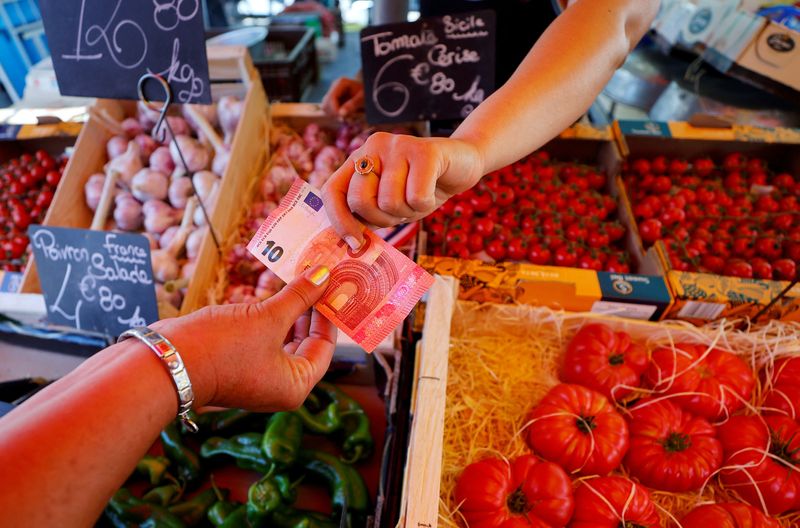By Dhara Ranasinghe and Amanda Cooper
LONDON/SINGAPORE (Reuters) -The euro fell as French shares and bonds tumbled on Monday, following President Emmanuel Macron’s decision to call early parliamentary elections after being defeated by the far right in the European Union.
The euro fell as much as 0.6% to a one-month low of $1.0733 and hit a 21-month low against sterling of 84.49 pence.
French blue chip shares fell 1.6%, led by steep losses at lenders such as BNP Paribas (OTC:) and Societe Generale (OTC:), making it the worst performing index in Europe. The European benchmark fell by 0.5%.
French government bond prices also fell, pushing 10-year financing costs to their highest level this year, around 3.20%. Centre, liberal and socialist parties were expected to retain majorities after the European Parliament elections, but Eurosceptic nationalists made the biggest gains, raising questions about the major powers’ ability to steer policy in the bloc.
Macron made a risky gamble to restore authority and called parliamentary elections with a first round on June 30.
If the far-right National Rally party wins a majority, Macron would no longer have a say in domestic affairs.
“That’s probably somewhat bad news for the markets,” said Holger Schmieding, Berenberg’s chief economist.
“It introduces an unexpected element of uncertainty.”
Britain will hold a general election on July 4 and crucial US elections will take place in November, while markets have become vulnerable recently as expectations of US interest rate cuts have waned.
Kathleen Brooks, research director at trading platform can scale.
“The question for traders in the euro and European stock markets is how radical will Marine Le Pen and Jordan Bardella be if they do well in the French parliamentary elections?” she said, referring to two far-right leaders in France.
WAKEUP CALL?
While euro and eurozone assets have largely been cushioned by reduced Euroscepticism compared to the elections of the 2010s and early 2020s, the results and France’s surprising response could be a wake-up call.
Demand from premium bond investors to hold French government bonds, rather than German benchmark bonds, reached a six-week high, rising 7 basis points (bps) to 55 bps.
The gap between German and Italian government bonds, which investors see as a gauge of risk appetite in the broader region, also widened to almost 140 basis points, the highest level since late April.
“It is clear that the early elections are a new source of uncertainty, which should have a negative impact on economic and market confidence, at least in France,” said Jan von Gerich, chief market analyst at Nordea.
But he noted that EU election results do not always translate into domestic results, due to different voting systems and because EU elections tend to attract a larger protest vote.
That said, shares in French banks were battered, with Societe Generale falling almost 8% while BNP Paribas fell 5%, as investors worried their funding costs could rise if French government bonds become more expensive amid higher expenses, bankers said.
Analysts also noted that a major victory for the far right in parliamentary elections could pave the way for a tax on bank profits – another reason why shares in French lenders were hit so hard on Monday.
The cost of insuring both banks’ debts against default rose to about the highest level in a month, according to data from S&P Global Market Intelligence.
The European Central Bank made its first interest rate cut in five years last week and the currency has fallen almost 2.5% against the dollar this year, driven mainly by the relative prospects for interest rate cuts in the euro area and the United States.

In France, where concerns about the country’s high debt levels have increased this year, the implications of renewed political uncertainty for the economy could also come into focus.
Standard & Poor’s cut its rating on France’s sovereign debt last month, delivering a stinging rebuke of the government’s handling of the tight budget days before the EU elections.


